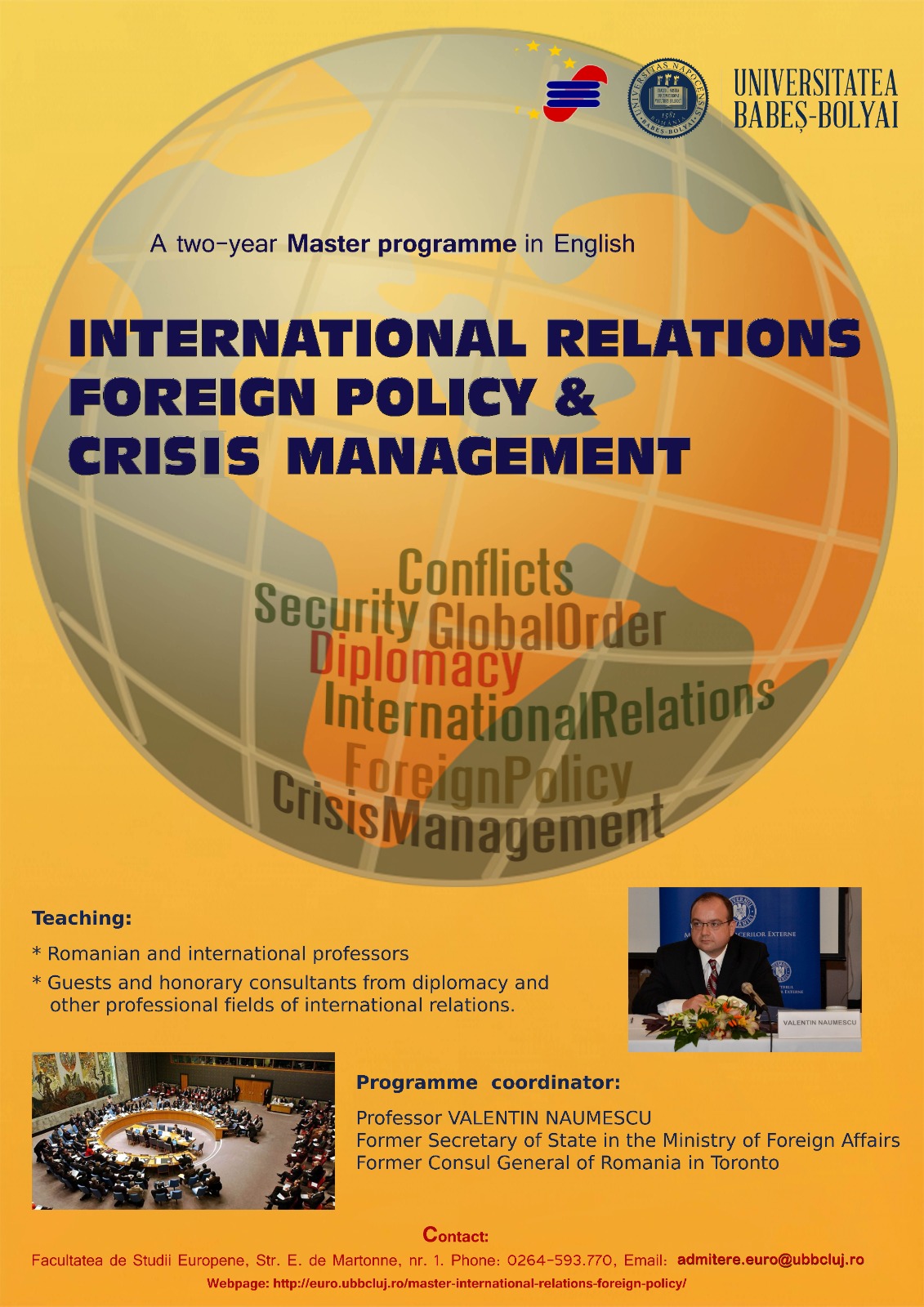Program: International Relations, Foreign Policy and Crisis Management
Domain: International Relations and European Studies
Language: English
Duration: 4 semesters
International Relations, Foreign Policy and Crisis Management MA Program provides an excellent opportunity for study, research and internship in a changing geopolitical context and the dynamic region of Central and Eastern Europe. It combines fundamental theoretical disciplines in the field of International Relations with focused specializations in areas such as: global and regional politics, foreign policy, diplomacy, security studies or crisis management. The war in Ukraine makes the three pillars of our MA program even more timely, while the future reconstruction of Ukraine and possible EU and NATO enlargement to the East require new and creative experts.
The basic aim of this new Master program is to prepare graduate students with useful abilities and knowledge for careers in the field of applied international relations, focused on diplomatic profession and related job opportunities dealing with international actions and interventions: national diplomacy (Ministry of Foreign Affairs), EU diplomacy (EEAS), NATO, UN agencies such as UNHCR, Red Cross, international NGOs, research institutes and think tanks, companies operating in areas of transition, European integration and post-war reconstruction etc.

Admission to the MA program consists in an interview during which the candidates will discuss with the commission their interest in any topic pertaining to the broad fields of internatioanl relations, foreign policy and crisis management.
The interview will be like a free discussion, and is meant to help the interview commission assess the candidate’s interest in and commitment for pursuing a degree in this challenging contemporary subjects.
There is no compulsory bibliography for the interview, the candidates being free to consult whatever sources they consider relevant.
Knowledge of English (attested by a language proficiency certificate) is a prerequisite for applying to this program.
The list of accepted language certificates is available on the faculty webpage, masters admission section.
Internationl students and Romanian students who graduaded a Program in English do not have to certify their English proficiency.
The admission process takes place every year in July and September. Romanian and EU citizens can apply for a budget places (extra places will be available based on tuition fees).
The number of places is limited, so early admission is advised. For more information, please visit the masters admission section of the faculty website; details about the number of places available for the next academic year will be updated periodically.
For more information about the interview and admission procedure, please contact Dr. Raluca Moldovan (raluca.moldovan@ubbcluj.ro)
First year of study
- Contemporary concepts and approaches in international relations theory
- Comparative institutions and politics in Europe and North America
- Types of international crises
- Instability and conflicts in the Eastern neighbourhood
- Societal and environmental security
- Protest movements, radicalization and contemporary crises
- Migration and refugees
- United Nations and crisis management
- Transatlantic relations and the crises of the international system
- Methods of research and analysis in social sciences
Second year of study
- Great Powers foreign policy
- Humanitarian crises and international NGOs actions
- The crises of the Middle East
- Tensions, crises and conflicts in Asia
- Terrorism and security threats
- EU’s role in crisis management
- Cultural diplomacy strategies
- Professional development and applied internship program
- Professor. Habil. Valentin Naumescu – Program Director
- Professor Habil. Sergiu Mișcoiu
- Assoc. Prof. Laura Herța
- Assoc. Prof. Raluca Moldovan
- Assoc. Prof. Ana Pantea
- Assoc. Prof. Șerban Văetiși
- PhD Lecturer Gabriel Gherasim
- PhD Lecturer Monica Meruțiu
- PhD Lecturer Ovidiu Vaida
- Valentin Naumescu, Războiul pentru supremație SUA-China și cele cinci forțe care schimbă lumea. Consecințe pentru România, Editura Polirom, Iași și București, 2022. Cărți – Editura Polirom
- Valentin Naumescu, Raluca Moldovan, Anda Ghilescu (Eds.), The New Transatlantic Relations and the Perspectives of the Global Order, Presa Universitară Clujeană, 2021. http://www.editura.ubbcluj.ro/bd/ebooks/pdf/2989.pdf
- Valentin Naumescu (Ed.), The New European Union and Its Global Strategy. From Brexit to PESCO, Cambridge Scholars Publishing, Newcastle upon Tyne, 2020. The New European Union and Its Global Strategy: From Brexit to PESCO – Cambridge Scholars Publishing
- Valentin Naumescu, Politica marilor puteri în Europa Centrală și de Est. 30 de ani de la sfârșitul Războiului Rece, Editura Humanitas, București, 2019.Politica Marilor Puteri în Europa Centrală și de Est
- Valentin Naumescu, ed. – Criza Uniunii Europene și ordinea globală în era Trump (2017)
- Valentin Naumescu – Marile schimbări. Crize şi perspective în politica internaţională (2015)
- Valentin Naumescu, Dan Dungaciu – The European Union’s Eastern Neighbourhood Today: Politics, Dynamics, Perspectives (2015)
- Valentin Naumescu, ed. – Democracy and Security in the 21st Century: Perspectives on a Changing World (2014)
- Valentin Naumescu, ed. – Foreign Policy and Diplomacy. An Introduction
- Valentin Naumescu – Teme de politică internațioanlă. Conflicte, tensiuni, dezbateri
- Sergiu Mișcoiu – Au pouvoir « par le peuple ». Le populisme saisi par la théorie du discours
- Valentin Naumescu – Sisteme politice comparate
- Valentin Naumescu – Politici sociale în Europa postbelică. Spre un model neo-liberal global ?
- Sergiu Mișcoiu – Naissance de la nation en Europe
- Sergiu Mișcoiu, Oana Crăciun, Nicoleta Colopelnic – Radicalism, Populism, Interventionism
- Valentin Naumescu – Politics and Government in Canada: An Introduction
- Valentin Naumescu ed. – Studii de securitate
- Laura Herța – De la relațiile româno-sârbe la relațiile româno-iugoslave. Interpretări constructiviste
The International Relations, Foreign Policy and Crisis Management MA Program provides students an ideal academic environment for improving their knowledge and skills as well as consolidating their initial professional qualification, in the large spectrum of international relations.
The program prepares therefore students for professional careers in diverse fields, routes and projects, such as:
- diplomacy and international (political) relations
- governmental agencies and departments
- political career
- central and local administration (IR officers)
- multinational corporates
- non-governmental organizations
- educational, cultural and media institutions
- research centres


